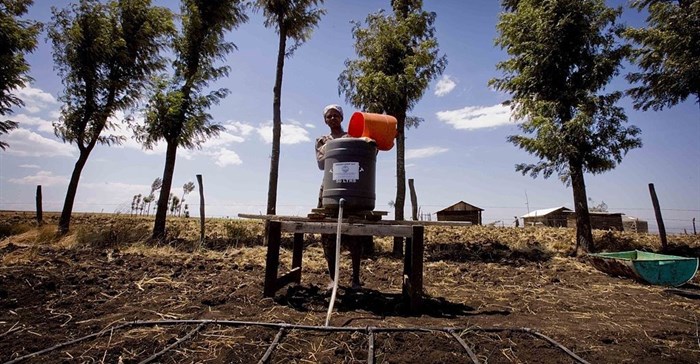How a lack of access to reliable weather data is hurting African farmers

Africa is a net food importer. Imports are expected to increase from $39 billion in 2016 to over $110 billion by 2025.
Food production is desperately low in the region. This is largely because of poorly developed farming technologies which drive rain-fed farming practices. On top of this is the fact that there are poorly developed climate and weather alert systems to help farmers plan for crop seasons and adopt better ways of farming.
Farmers can’t access reliable and usable weather data. Information is often unavailable and even if it does exist, the quality is poor or it’s inaccessible to those who need it most. Farmers don’t get efficient information on drought forecasts, rainfall distribution and pest outbreaks.
This is because African governments and development agencies don’t understand and prioritise the value of climate and weather data. This has stifled investment in infrastructure and proper functioning of state institutions charged with collecting and serving climate and weather data.
There are funds that African governments can tap into. One example is the Green Climate Fund adopted in 2011 as the funding arm of the United Nations Framework Convention on Climate Change. It has raised $10.2 billion to finance adaptation and mitigation projects and programmes in developing countries.
For the fund to deliver on its potential, it must finance infrastructure on basic meteorological observations, for example, to generate climate and weather data fit for agricultural purposes. This will provide a boost for farmers’ ability to withstand dry and rainy seasons and to adopt the correct farming practice.
Africa needs to acknowledge and welcome the role of the private sector too. Without its investment Africa won’t be able to bridge the massive gap in infrastructure needed to collect reliable data, and to make it easily available. But that would mean sharing what data there is. A major rethink of how this is viewed is long overdue.
A lack of data
In the Horn of Africa farmers in Somalia are grappling with droughts and poor rainy seasons. This has affected food production, making more than five million people food insecure. These farmers have no knowledge of how long and how intense the droughts will be. Information like this would help them decide when to plant and harvest.
In Cote d’Ivoire, cocoa farmers live in fear of heavy downpours in the rainy season which can lead to their farms flooding. This is a major threat to cocoa which accounts for 20% of the country’s gross domestic product. Around five million people depend on the cocoa industry.

Cocoa farmers in Cote d’Ivoire can use climate-smart farming practices to know when to ferment and dry cocoa beans.
Flickr/SOCODEVI
If farmers were warned about intense rainfall they could take action to try and mitigate the risks. For example, those in low-lying areas could enhance soil structure to improve water filtration in times of flooding.
The National Meteorological and Hydrological Services is mandated by national laws and recognised in the Convention of the World Meteorological Organization.. Its aim is to collect and serve meteorological and hydrological forecasting and warning systems at country level. But it operates well below capacity in several African countries because of underfunding and low visibility.
In Africa, about 80% of the data from the meteorological service is unable to provide proper climate information and early warnings. This is as a result of decades of neglect by governments. It is worse in Africa than anywhere else in the world because massive investment and modernisation is needed.
Some African countries have a small number of operational meteorological stations to make important data available. In the Omo-Gibe region of Ethiopia, for example, hydrological equipment was installed three years ago by the government and the UN Economic Commission for Africa.
But the World Metrological Organization estimates that an additional 4,000 to 5,000 basic meteorological observations are needed across the continent. The World Bank estimates that about $1 billion is needed to modernise Africa’s meteorological services. It also estimates that a minimum of $400 million to $500 million per year will be needed to support modernised systems, including staff costs and operating and maintenance costs.
The private sector could play a role
Governments don’t have the capacity and expertise to provide complete solutions, particularly when it comes to the investment needed. They will require partnerships in the agriculture, insurance and telecommunication sectors. These partnerships are necessary for the collection and the delivery of data and for critical services including risk analysis, commodity prices, insurance and secure payment schemes.
There are good examples of innovative solutions being put in place. ECONET, a local mobile phone operator in Zimbabwe, recently started a large scale weather-indexed insurance for farmers in Zimbabwe, known as Ecofarmer. The service has benefited 900,000 farmers so far.
Strong political support is needed to increase smart systems through partnerships – between national authorities, technical agencies, non-governmental organisations and the private sector.
![]() But, most importantly, African governments must invest in modernising their weather and climate data. And they must forge strong partnerships with private companies and businesses.
But, most importantly, African governments must invest in modernising their weather and climate data. And they must forge strong partnerships with private companies and businesses.
This article was originally published on The Conversation. Read the original article.
Source: The Conversation Africa

The Conversation Africa is an independent source of news and views from the academic and research community. Its aim is to promote better understanding of current affairs and complex issues, and allow for a better quality of public discourse and conversation.
Go to: https://theconversation.com/africa
















